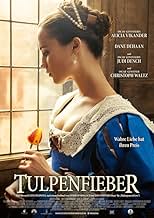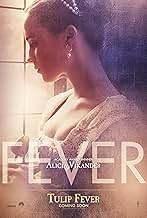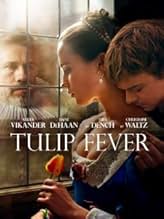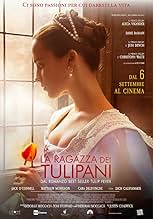An artist falls for a young married woman while he's commissioned to paint her portrait during the Tulip mania of seventeenth century Amsterdam.An artist falls for a young married woman while he's commissioned to paint her portrait during the Tulip mania of seventeenth century Amsterdam.An artist falls for a young married woman while he's commissioned to paint her portrait during the Tulip mania of seventeenth century Amsterdam.
- Awards
- 1 nomination total
Richard Alan Reid
- Bidder 1
- (as Richard Reid)
Featured reviews
A pretty good period piece set in an interesting location during an even more interesting time, could have been great, but overall it's still good enough.. Christoph Waltz walks on water as always!
How could such a beautiful looking movie fall so flat? Sumptuous filming, a stellar cast, with brilliant period sets and costumes are not enough to disguise the fact that Tulip Fever (2017) drowns under the weight of its own plot contrivance and melodramatic performances.
Set in 17th Century Amsterdam, it tells the story of an orphan who "arrived barefoot and left in a carriage". Selected to marry for her great beauty, Sophia's (Alicia Vikander) sole purpose is to bear a child for wealthy merchant Cornelius (Christopher Waltz) whose first marriage was barren. Cornelius commissions struggling artist Jan (Dane DeHaan) to paint their portrait to celebrate his wealth and her beauty but the artist immediately falls under her spell. While the affair progresses, her maidservant Maria (Holliday Grainger) falls pregnant to a fishmonger and the two women concoct a subterfuge whereby Sophia pretends to be pregnant to keep Maria's secret. As a background sub-plot, Jan seeks his fortune in the over-heated tulip market by purchasing the rarest of tulip specimens from an imperious nun (Judi Dench). Melodrama turns into farce as the multiple narratives interweave, tighten, yet ultimately go nowhere.
High visual production values do not make up for story implausibility. The months of unsuccessful mating between Cornelius and Sophia is portrayed as a bawdy comedy of nightly rituals where Cornelius struggles to perform his marital duties. The affair under her husband's nose, the fake pregnancy, and fake birth are all ludicrously implausible. The background tale of wild speculations on the fickle tulip market is a distraction rather than necessary for Jan's predictable investment outcomes. The script sounds unnatural and dialogue is delivered unconvincingly: many lines are spoken across class boundaries in ways that would have been unimaginable in that era. With a top- shelf cast, the acting is flawless although Alicia Vikander stands out for the way she plays the same Alicia Vikander that we have seen in several films. The chemistry with both husband and lover is of the barely flickering variety, and her impersonation of Mona Lisa is, as always, impeccable.
Does the film's ending justify the effort? Disappointingly, no. The fate of all the characters is disconnected from the narrative flow and the storyline threads remain dangling in the wind. For some audiences, the beauty of this production will be worth the commitment. However, after an hour and forty-five minutes, all we learn is that great beauty, wealth, greed, and deception, do not bring happiness; nor do aesthetics alone make a great movie.
Set in 17th Century Amsterdam, it tells the story of an orphan who "arrived barefoot and left in a carriage". Selected to marry for her great beauty, Sophia's (Alicia Vikander) sole purpose is to bear a child for wealthy merchant Cornelius (Christopher Waltz) whose first marriage was barren. Cornelius commissions struggling artist Jan (Dane DeHaan) to paint their portrait to celebrate his wealth and her beauty but the artist immediately falls under her spell. While the affair progresses, her maidservant Maria (Holliday Grainger) falls pregnant to a fishmonger and the two women concoct a subterfuge whereby Sophia pretends to be pregnant to keep Maria's secret. As a background sub-plot, Jan seeks his fortune in the over-heated tulip market by purchasing the rarest of tulip specimens from an imperious nun (Judi Dench). Melodrama turns into farce as the multiple narratives interweave, tighten, yet ultimately go nowhere.
High visual production values do not make up for story implausibility. The months of unsuccessful mating between Cornelius and Sophia is portrayed as a bawdy comedy of nightly rituals where Cornelius struggles to perform his marital duties. The affair under her husband's nose, the fake pregnancy, and fake birth are all ludicrously implausible. The background tale of wild speculations on the fickle tulip market is a distraction rather than necessary for Jan's predictable investment outcomes. The script sounds unnatural and dialogue is delivered unconvincingly: many lines are spoken across class boundaries in ways that would have been unimaginable in that era. With a top- shelf cast, the acting is flawless although Alicia Vikander stands out for the way she plays the same Alicia Vikander that we have seen in several films. The chemistry with both husband and lover is of the barely flickering variety, and her impersonation of Mona Lisa is, as always, impeccable.
Does the film's ending justify the effort? Disappointingly, no. The fate of all the characters is disconnected from the narrative flow and the storyline threads remain dangling in the wind. For some audiences, the beauty of this production will be worth the commitment. However, after an hour and forty-five minutes, all we learn is that great beauty, wealth, greed, and deception, do not bring happiness; nor do aesthetics alone make a great movie.
Great cast! Fine Acting! Glossy cinematography! Terrific sets! Excellent costuming! Even an intriguing first half of the film! Yet, ultimately Justin Chadwick's historical romantic drama concerning a 17th-century painter in Amsterdam who falls in love with a married woman whose portrait he has been commissioned to paint, during the period known as "Tulip Mania", fails due to its implausible, improbable, narrative outcomes.
It just goes to show that films left on the studio shelves for 3 years after being completed, before being released, as was the case with Tulip Fever, are usually top - shelved for good reason. In this case the film seems to have suffered through a combination of script and editing deficiencies and some poor directorial choices. It results in a movie that doesn't seem to know whether it wants to be some sort of comedy - drama, or straight out melodrama in corsets.
Whether due to editing or some other production choice, nothing much is ever made really clear. The titular, historically authentic,Tulip Fever itself is barely sketched out and then only against the incessant noise and rowdy crowds of Amsterdam's flower markets. Early in the film a quite close and friendly relationship is hinted at between the 2 female leads, Sophia (Alicia Vikander), a wealthy merchant's unhappy young wife and her maidservant, the more earthy and world - wise Maria (Holiday Grainger). Their love - lives are compared and contrasted with Sophia clearly ensnared in a loveless arranged marriage. But this thread is never really consolidated.
Instead we are served up a mish - mash of multiple storylines concerning fake and real pregnancies, suspicious lovers and various characters seeking their fortunes through investment in an over - heated tulip market. It all ends up being ludicrously implausible and both unfunny and undramatic, with a tacked on, unconvincing conclusion. What a waste!
I've given it a 6, because I'm sure there will be some, who like me, appreciate historical films such as this, with obviously high production values. There's no getting around the fact that Tulip Fever looks good. And Alicia Vikander is perfect as Sophia, plucked from obscurity in an orphanage and selected to marry for her great beauty. Similarly, Grainger succeeds as the pragmatic, Maria, who is anything but a dullard, or your conventional notion of a put upon servant. But these positives can't disguise that Tulip Fever ends up looking and sounding like a completely miscalculated opportunity, rather than a significantly interesting, period drama.
It just goes to show that films left on the studio shelves for 3 years after being completed, before being released, as was the case with Tulip Fever, are usually top - shelved for good reason. In this case the film seems to have suffered through a combination of script and editing deficiencies and some poor directorial choices. It results in a movie that doesn't seem to know whether it wants to be some sort of comedy - drama, or straight out melodrama in corsets.
Whether due to editing or some other production choice, nothing much is ever made really clear. The titular, historically authentic,Tulip Fever itself is barely sketched out and then only against the incessant noise and rowdy crowds of Amsterdam's flower markets. Early in the film a quite close and friendly relationship is hinted at between the 2 female leads, Sophia (Alicia Vikander), a wealthy merchant's unhappy young wife and her maidservant, the more earthy and world - wise Maria (Holiday Grainger). Their love - lives are compared and contrasted with Sophia clearly ensnared in a loveless arranged marriage. But this thread is never really consolidated.
Instead we are served up a mish - mash of multiple storylines concerning fake and real pregnancies, suspicious lovers and various characters seeking their fortunes through investment in an over - heated tulip market. It all ends up being ludicrously implausible and both unfunny and undramatic, with a tacked on, unconvincing conclusion. What a waste!
I've given it a 6, because I'm sure there will be some, who like me, appreciate historical films such as this, with obviously high production values. There's no getting around the fact that Tulip Fever looks good. And Alicia Vikander is perfect as Sophia, plucked from obscurity in an orphanage and selected to marry for her great beauty. Similarly, Grainger succeeds as the pragmatic, Maria, who is anything but a dullard, or your conventional notion of a put upon servant. But these positives can't disguise that Tulip Fever ends up looking and sounding like a completely miscalculated opportunity, rather than a significantly interesting, period drama.
I loved it...I really did. It is slow paced, what I absolutely like.
The costumes where beautiful and detailed.
Also the scenery was well done and gave an atmosphere of how it used to be.
Worth watching...not the best...but really enjoyed it!
Worth watching...not the best...but really enjoyed it!
Countless reviewers will address this movie saying it was dismal and thin. They say the plots and subplots were disconnected and on loosely held together by a weak premise.
I thought the opposite. I chose to watch it anyway because of the cast. I'll admit none of them had a remarkable performance, award winning or otherwise. I think they were all fairly balanced without overselling any particular role. While the story centered around Sophia primarily, you could sense the desire, intrigue and frustration of the other characters. I went into it with no knowledge of the plot, tulipmania, or even the actual setting. About halfway through I began to get the feeling, "I see what going on here. This plots been done and redone." I thought I knew what to expect. At times I was right, but at others, grossly wrong. I thoroughly enjoyed this movie and would enjoy watching it again. The plot moves so quick at times I know I'll see more next time.
I've told you what I thought. Don't let anyone tell you what to think. Watch it and make up your own mind. I've seen far worse movies get higher praise.
I thought the opposite. I chose to watch it anyway because of the cast. I'll admit none of them had a remarkable performance, award winning or otherwise. I think they were all fairly balanced without overselling any particular role. While the story centered around Sophia primarily, you could sense the desire, intrigue and frustration of the other characters. I went into it with no knowledge of the plot, tulipmania, or even the actual setting. About halfway through I began to get the feeling, "I see what going on here. This plots been done and redone." I thought I knew what to expect. At times I was right, but at others, grossly wrong. I thoroughly enjoyed this movie and would enjoy watching it again. The plot moves so quick at times I know I'll see more next time.
I've told you what I thought. Don't let anyone tell you what to think. Watch it and make up your own mind. I've seen far worse movies get higher praise.
Did you know
- TriviaThis movie was shot in 2014 but the release was postponed for three years. The first test screening happened in November 2014 and didn't get positive reactions. This movie was originally scheduled to be released in June 2016, but the release date was pushed to July 2016, then to February 2017, August 25, 2017, and it was finally released in theaters in September 1, 2017.
- GoofsWhen Jan is telling the bailiffs "if I was liquid now I'd be a bigger fool than I look," his mouth stops moving well before the dubbed line finishes.
- Quotes
Cornelis Sandvoort: First to flower, first to fall.
- ConnectionsReferenced in Midnight Screenings: Valley of Bones (2017)
- How long is Tulip Fever?Powered by Alexa
Details
- Release date
- Countries of origin
- Official sites
- Language
- Also known as
- Тюльпанова лихоманка
- Filming locations
- Production companies
- See more company credits at IMDbPro
Box office
- Budget
- $25,000,000 (estimated)
- Gross US & Canada
- $2,455,635
- Opening weekend US & Canada
- $1,158,017
- Sep 3, 2017
- Gross worldwide
- $9,204,549
- Runtime1 hour 45 minutes
- Color
- Sound mix
- Aspect ratio
- 2.35 : 1
Contribute to this page
Suggest an edit or add missing content

































